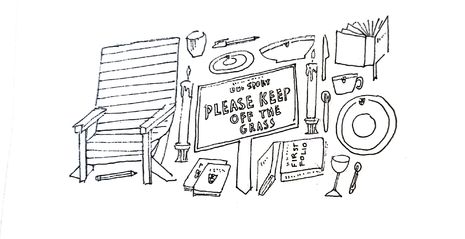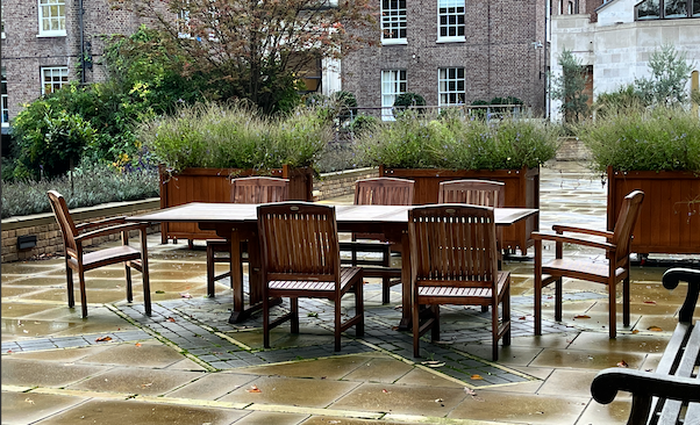Why do Cambridge students love to steal?
From crockery to candlesticks, we can’t seem to resist the allure of theft

From traffic cones propped up in staircases to formal forks lined up neatly on bookcases, Cambridge students revel in the cheap thrill of taking something from their college… and putting it somewhere else. This impish instinct has us in its grips. There’s apparently an invisible demarcation line around the University, one that establishes it as a world in which theft is infinitely more alluring than it is anywhere else. Back at home, I was always wary of the consequences of stealing things from those in authority. Sod’s law felt palpably real, as I was always haunted by the gut feeling that somehow I’d get caught.
Upon arriving at Cambridge, this was turned on its head. Older years displayed their pilfered crockery like family heirlooms, friends cooed in awe at their mate who swiped the Master’s name card after formal, and there were always mutterings about bigger and more ambitious heists. Only last Michaelmas, news of the candlestick that had mysteriously “disappeared” and then re-appeared in college was the topic of conversation for a solid week or so (“Butcher, Baker, Candlestick-taker” becoming my go-to cheap quip at the time). A friend from my own college admitted having taken “just” a fork, only to follow up by mentioning his mother displays it in their home. A Newnham student who had taken their fair share of Christ’s plates remarked that they wanted a collection for when they’d leave Cambridge. Everywhere you go you meet someone who has taken a little piece of college away with them. But why?
“Theft becomes part of the fabric of the university’s oral history”
What is it about Cambridge that propels people to behave this way? Everyone who had admitted swiping the odd plate or two said they wouldn’t do so at home, or at any other university, really. Picture in your mind what this institution may uniquely be imagined to be like for someone from beyond “Reality Checkpoint”. A few words spring to mind: “Academic rigour”, “history” or even “innovation”. But I think there’s also a real sense of “magic”, a folkloric quality to these walls. It’s what we emphasise to prospective applicants on open days. Yes, there is a lot of chat about en-suites and gym facilities, but there’s also always a mention of quirky traditions and the surreal nature of Cambridge life. Dashing across the grass before the porters catch you, various not-so-secret secret societies, the urban legends about pennying, punting, and porterings. These all add to the story of this place, and the few places like it.
What’s this got to do with taking things from formals? Well for a lot of us, the magic of the University is somewhat defanged and demystified upon arrival. It’s hard to feel especially part of the academic fairytale whilst trying to juggle supervisions and nights at Revs. Now since anyone can bring back a coaster or a postcard, the best way to confirm that they’re part of this “mystical” world within a world, is to take things that really only university members have the chances to take. Unlike a giftshop Cambridge mug, a stolen spoon is the physical confirmation that you’re “in”, as is the story behind it. Tales like the chair taken from Sidney’s lawn become part of the University’s oral history, and there’s no reminder of your time here more permanent than going down in the annals of college larceny.
“As one thief I asked put it, ‘you want to feel important – Cambridge and Oxford feel important’”
Occasionally, of course, there are consequences. In practice, however, colleges are more likely to just give their students a mere slap on the wrist or a strongly worded Outlook email when things do cross the line. There are simply too many instances to be able to chase all of them up, so this unwritten tradition is only brought to our attention when the more valuable items go missing. The way it persists despite the official curbs makes it seem a lot less like pickpocketing and more like taking mementos from some ancient ruins. Still theft, sure, but one motivated by a sense of wanting to be part of something bigger than yourself. As one thieving interviewee I asked put it, “you want to feel important – Cambridge and Oxford feel important”.
For many, everyday life at Cambridge seems surreal, and the occasional theft appears to inject a dash of sophomoric fun into accepting it as our day-to-day reality. Either by bringing a small trinket back home or, better yet, by becoming a little piece of the University’s thieving folklore yourself, you always seem to be one butter knife closer to feeling a true part of the story.
 News / Eight Cambridge researchers awarded €17m in ERC research grants27 December 2025
News / Eight Cambridge researchers awarded €17m in ERC research grants27 December 2025 News / Downing investigates ‘mysterious’ underground burial vault 29 December 2025
News / Downing investigates ‘mysterious’ underground burial vault 29 December 2025 Lifestyle / Ask Auntie Alice29 December 2025
Lifestyle / Ask Auntie Alice29 December 2025 Sport / Hard work, heartbreak and hope: international gymnast Maddie Marshall’s journey 29 December 2025
Sport / Hard work, heartbreak and hope: international gymnast Maddie Marshall’s journey 29 December 2025 Interviews / Meet Juan Michel, Cambridge’s multilingual musician29 December 2025
Interviews / Meet Juan Michel, Cambridge’s multilingual musician29 December 2025










